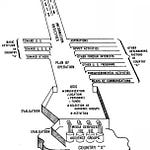This is the reading of my December 13, 2022 post, The Propaganda of Propaganda. It is nearly thirty minutes because I added commentary that was not in the original post. Still, this is not a comprehensive article (yet).
The “propaganda of propaganda” is a real problem that undermines the understanding, awareness, and support for supporting our foreign policy and defending against, proactively or reactively, adversarial efforts (i.e., not just malign influence operations). To further this point, the following is from the Preface of a book. The date and title are below, but I believe the words are evergreen and arguably more fitting for today than when they were written.
This book is based on several premises that have been accepted by an increasing number of knowledgable persons in and out of governemtn, but have been explored little in public print.
The first premise is that no matter how the balance of military power is maintained throughout the world, whether by total nuclear armament, reduced capability on all sides to deal with just military “brushfires,” or complete disarmament, the ideological conflict will rage unabated. The ideology of our adversaries is basically the same, whether advanced under the guide of “peaceful coexistence” by the Soviet Union or backed by the military adventures of Red China. The differences are not so much ideological as they are strategic.
The seonc premise is that, whatever the level of a military balance or the degree of action short of nuclear war, proapganda is a major weapon in the ideological conflict. Propaganda, in this sense, is defined as paramilitary deeds and words designed to make others believe or act the way the propagator wants them to believe or act.
The third and perhaps most debated premise is that both the means and ends of proapganda can be either good or evil. There are those who righteously argue that this premise is invalid. By the preceding definition, their arguments could constitute propagada. I do not mean to deplore their use of propaganda. I merely point out that they are as self-contradictory as the conscientious objetor who uses a gun to express his objections.
The fourth and most important premise is that we as a nation must rid ourselves of the strange quieasiness we feel about propaganda if our conduct in the ideological conflict is to be anything but haphazard. For that reason, I have eschewed eophemisms. Propaganda is call propaganda. Except in a few instances where verbal variation is necessary, such terms as “information program” are not used. Nor do I use the propaganda-laden phrases commonly used by anti-proapganda elements, such as “mind manipulation.”
Those most suspicious of propaganda as an ideological weapon can be found among our most articulate opinion leaders. Many journalists argue for “straight information,” yet the most successful of the are interpretative reporters or analysts; that is, they interlard information with their opinions and encourage others to see things their way. Many educators deplore “mind manipulation”; yet, are not their lamentations an attempt to shape attitudes into forms they consider desirable? Such inconsistency of though processes among many thought leaders has contributes to our propaganda weaknesses.
The above is from a 1963 book called The Propaganda Gap by Walter Joyce. The first chapter is “The war we are losing.”
The author rightly attacks the propaganda of propaganda as he discusses the Maginot Line (my term, not his) we have constructed with “defenses for a hot war” that puts us “in dire danger of losing the struggle the minds of men” (his words). At about the time this book came out, George Gallup noted, “If a country is lost to communism through propaganda and subversion, it is lost to our side as irretrievably as if we had lost it in actual warfare.”
I have recently started using the term Maginot Line to describe the US reliance on military-based deterrence. We may lament adversaries using political warfare, information, “little green men,” and other so-called “asymmetric” or unconventional methods, but the reality is we have constructed our policies, decision-making, and organizations to avoid these areas of engagement in favor of the Maginot Line.
Truth be told, I didn’t come up with the idea of applying this in the modern, post-WWI context. I’m adapting it from a 1955 article in Foreign Affairs called “Military Policy and Defense of the Grey Areas” by Henry Kissinger.
As always, please share any feedback or comments. Also, feel free to share as you see fit.








Share this post